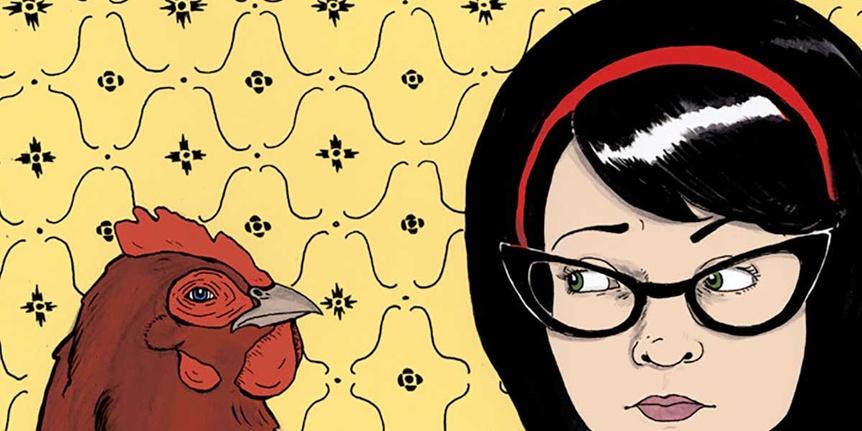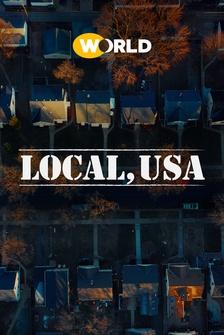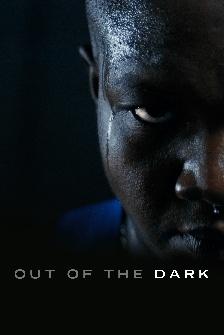-Freedom.
The absolute freedom of being a Fronterizo or a Fronteriza person is to be able to go between countries.
Even though, I mean, like I'm a Mexican national, I've always had this freedom to occupy two different countries almost simultaneously.
You are kind of living in two cultures at the same time.
We're sharing water, we're sharing culture, we're sharing airwaves, we're sharing people.
[ Electronic music plays ] You are listening to "Border, Beats, & Babes" on Marfa Public Radio, broadcasting to the Big Bend in West Texas.
-[ Speaking Spanish ] ♪♪ -I grew up in Juárez.
Went to high school in Juárez, and graduated there.
Went to university at UTEP in El Paso.
But yeah, born, raised, and everything in between.
There's these ideas of what Mexican and Latin American music is.
And I want to show where it's at right now.
So my show is "Border, Beats, & Babes."
I've been doing it for several years.
It's on Marfa Public Radio, in Marfa, Texas.
It's about showcasing this kind of duality of the border, you know, like what is going on not only in the border, but on both sides of it.
Hello, everybody.
This is "Border, Beats, & Babes," broadcasting from Marfa, Texas.
♪♪ -I am the, what would you call it, the minority of this area?
My parents live in Presidio, but I now live in Ojinaga, which is literally only five minutes away crossing the bridge.
And I grew up in Presidio, went to school in Presidio, made friends in Presidio, but I was one of three white kids that went to school in Presidio.
And I remember being a little girl and just thinking you know, if I want to have friends where I'm living here, like, I need to feel comfortable speaking Spanish.
Like, I just have to.
♪♪ Our family dynamic is very interesting because being a white person, as a mariachi player, you have to gain the respect because if you don't, it's embarrassing.
E, G, A.
Obviously, when we play somewhere and they see that we're white, you know, it's kind of like they just stare at us.
Like, it doesn't matter who it is.
Anybody's just like, "What?
What is going on?"
The moment we play, though, that all goes away.
It's kind of like, "look, we know it looks weird, but we got something to show you."
[ Static crackling ] -[ Speaking Spanish ] Let's do this.
♪♪ So my husband works on the Mexican side of the border as an engineer, but that does not mean that he can cross to the United States.
He initially applied for a tourist visa, and that was denied, and once we got married, he applied for a resident visa, and that is still in the process of being accepted.
Well, my dad is the mayor of Presidio.
I think a lot of people assume that the visa process is so easy to where the mayor of a town would have access to give him a ticket to be able to come over or something, you know.
But no, that's definitely not the case.
I can't like make a wish and him just, you know, pop over here.
I would love for him to be here, but it's not that easy.
So we just got the new house.
I have a house in Mexico.
We have a house in Mexico.
-You can feel in that office and all this interview and stuff like that, you feel like a criminal, you know, like, it's just they judge everything about you, you know, clothes, how you look.
They make you feel like, "You know what?
You're, to me, are a criminal... -It's like, you know, you see all these, you know, people crossing illegally.
Why do you think they're crossing illegally?
Because it's impossible to cross.
It's impossible to do it legally.
♪♪ -It's like every year, I know my visa expires in September, and every year is like, I hope I get it.
Because if not, it's my whole livelihood would change.
Like what I've known to be true, the spaces that I've occupied for 30 years, it's gonna change.
-The best evidence that we have for the oldest occupations in the region, somewhere in the neighborhood of about 11,700 years ago.
When times are hard on the south, you go to the north and vice versa.
And it's that collaboration and cooperation that allowed people to live in this incredibly difficult environment.
And not only live here, but thrive.
Now, most people think of that border as being a hard fought boundary that defines the southern U.S., and it really has never been.
Even though it's been marked on maps for a century, that border didn't exist really until 9/11.
It was a fluid border up until the 21st century.
If anything, it's more difficult now than it ever was because the border is being closed and secured.
You know, it begs the question, secured for who?
-The Big Bend, it's an "S" shape, and that "S" shape is what makes the yin-yang symbol.
If you put it within a circle, then you have this "S", then you have the two histories, two lands, two peoples complementing each other, night and dark.
Two dualities, but at the same time, they are one thing.
It's the same land.
You know, it's the same desert, it's the same river.
♪♪ Hello, everyone.
My name is Gabriela Carballo.
Good night.
This was "Border, Beats, & Babes."
Thanks for being here with me.
♪♪ I was not able to renew the visa.
At this point, I did file for an extension, and that case is pending.
They don't tell me why.
You know, they won't tell me that.
As much as I like my life and living in the U.S., I haven't been in my own culture for a while.
This Sunday, I was going to turn seven years living in Marfa.
[ Speaking Spanish ] I thought that I knew what my future was going to look like a year ago in some way, maybe not exactly.
So I'm five months pregnant.
Our baby will will be born, hopefully in the United States.
And the fact that, like, hey, my husband, you know, he may not be able to be there when the baby's born, like, that was something we had to talk about, like, at the very beginning.
Like, you're probably not going to be able to be there when I give birth, you know?
-He's growing now.
-We're going through the visa process, but more and more, we're not 100 percent sure we want to live in the United States.
Like, we've been forming our lives here.
And so it's just kind of complicated because then if he's able to go over to the United States, then he has to, like, stay there for a certain period of time before he can cross back to Mexico.
And he has a job here in Mexico that he has like a contract with.
So it's kind of like -- kind of a touchy subject.
Like, do we just start all over again?
You know what I'm saying?
I don't really see us living in the United States.
♪♪ [ Laughs ] ♪♪








